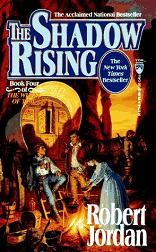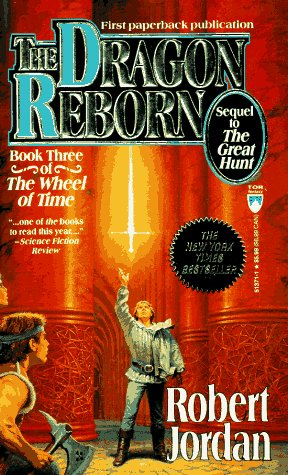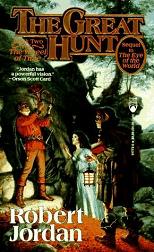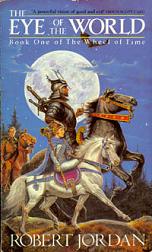Adam Roberts’ parody of Robert Jordan’s writing is mean but accurate:
Why did I fail? Oh, why did I fail to polish off wotviii this week, I thought to myself, creasing my brow and tugging my braids. Since the Age of Legends I have been reading this bu’u’ook, as the ancient bound codices were called. White streaking my beard and hair, I stroked the mindtrap upon my bedside table. I must be careful, I thought. Careful. To take care. Three different skills were in play, the ancient art of readin, the even more ancient and venerable art, of which only a few dozen in the world were true masters, of Turnian Pages, and, most difficult of all preventing the bitter, lethal brain num that inevitably pursued any man who dared to channel the antique magic of this kind of readin. It could be fatal, brain num. Fatal, it could be. I tugged my braid. The old Ar Selbow proverb came back to me: readin should be a chore, not a pleasure. I thought, oh, but I’ve read so much! To give up now would be … but I left the utterance an axe-handle short of completion. Was there room for any more? I tugged my braids. Hardly any hair left, I thought to myself. I wonder if tugging it all the time is responsible for it falling out? I wonder. I wonder.
But the parody quoted in a 1993 David Langford fanzine is more concise and just as funny, if not funnier. Which totally makes Adam’s version the more accurate, as Jordan, for all his virtues, was never adverse to use ten words when one would do, or seven sentences where two would suffice…
Adam is reading and reviewing the entire Wheel of Time series and not enjoying it much, hence the parody. He does so because, while he has read his share of epic fantasy, he’s “too ignorant of the 1990s and much of the noughties” which is why he “decided to give Jordan a whirl”. It’s been interesting to read his critiques, though not surprising that he finds Jordan hardgoing and not very good. Most honest fans of the series able to aprpeciate good writing will readily admit Jordan’s writing is not very good, workmanlike at best; much of the criticism Roberts levels at him was already talked about in rec.arts.sf.written.robert-jordan in the mid nineties. Where Adam gets it wrong is when he attempts to understand why people despite this keep reading the Wheel of Time books:
I get that for many people the deal is escape. Leave your worries behind; you enter this better world. It’s a world in which you don’t work in the accounts department of a mid-size educational supplies firm; where, instead, you live in a palace and command servants and have magic powers and enjoy exciting sex with beautiful people and are able to vent your repressed aggression in fighty-fight. Jordan’s twist on this venerable textual strategy is, partly, giving his readers much more detail than his market rivals; and partly, more cannily, creating the illusion of psychological depth. Simple wish-fulfilment gets old too soon; so Jordan’s Alexander-the-Great-alike is troubled by the fear he’s going mad. It’s not much, but it’s enough to separate him from the bulk of competitors.
[…]
And this is the part I can’t seem to get my head around: the fans know that it’s terribly written. They know and they don’t care. Why don’t they care? I don’t know why they don’t care.
[…]
What to say to such a review other than: don’t! Please don’t! The libraries of the world are crammed with beautiful, powerful, moving, mindblowing literature! Read some of that instead!
Adam gets two things wrong. Why people read The Wheel of Time when they know it’s not that good and that it’s possible to “trade in” the WoT series for better books and get the same pleasure out of it. It isn’t wish fulfillment that made me read the first book and then kept me reading: it was the story and the way Jordan told it. And I know the writing is workmanlike at best, the plot not all that original and the padding, oy, the padding! But as I said in my own review of The Eye of the World, Jordan had me hooked from that first scene. It’s not something you can really analyse and it has little to do with literay qualities: you get it or you don’t. If you don’t get it, that’s no big deal; the world is full with better books, but you can’t substitute them for the story Jordan told and the world he created.
It’s always difficult to explain why you enjoy something: in the end it all comes down to “I like it because it’s fun”. What I like in epic fantasy in general and Jordan in particular is a bit of escapism, of losing myself in a story, preferably a long story. The writing doesn’t have to be good to do this, as long as it isn’t so bad it becomes noticable. This isn’t at all comparable to the pleasure I also get from a good science fiction novel or something clever and literary; much more visceral, less intellectual perhaps. It’s also the pleasure in worldbuilding I got from Jordan, the way he which took standard fantasy concepts and remade them over the course of the series. The Encyclopedia of Fantasy agrees with me on that, noting the “ingenuity with which standard plot devices, backgrounds and charachters are subjected to constant and sophisticated modification”. That’s a pleasure that for others may not be enough to struggle through the series, or the kind of pleasure somebody like Adam is looking for, which is okay. It’s just that you can’t recreate this pleasure with a different set of books; certainly not with Nabakov…



